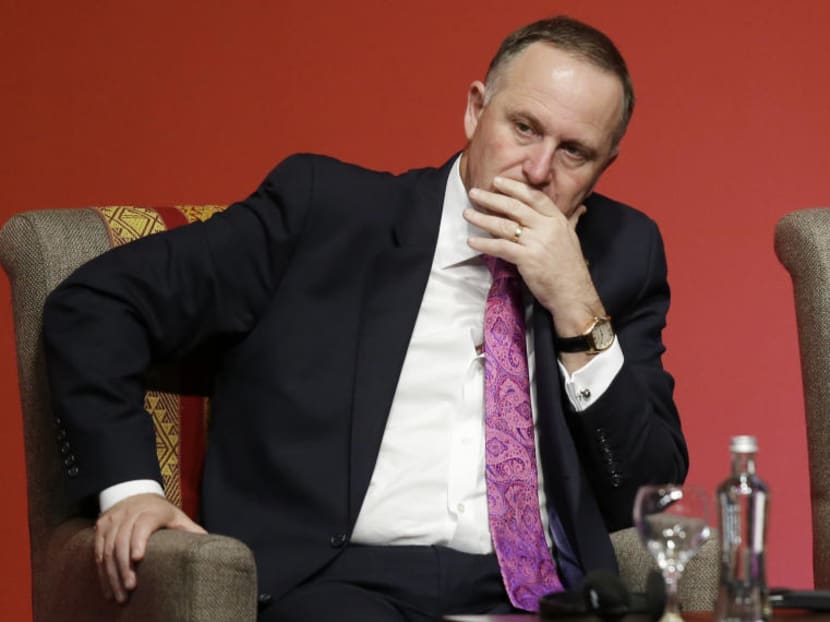Uphill task for New Zealand's next PM
WELLINGTON - New Zealand's next prime minister will have big shoes to fill after the shock departure of Mr John Key.

Outgoing New Zealand Prime Minister John Key (above) announced his resignation unexpectedly on Monday and Finance Minister Bill English is the leading candidate to succeed him. Photo: AP
WELLINGTON - New Zealand's next prime minister will have big shoes to fill after the shock departure of Mr John Key.
A politician with an uncanny ability to read the public mood, Mr Key's broad popularity has been the driving force behind the success of his National Party-led government.
While his deputy, Finance Minister Bill English, is the leading candidate to succeed him, there's no guarantee he would take the party to a fourth straight election victory in 2017 or remain at the helm for the long term.
"He's seen as a bit bland and boring, which is fine for a minister of finance because you want someone with stability and a bit more of a conservative look," said Dr Bryce Edwards, a political scientist at University of Otago.
"He's going to need something different as prime minister, and I'm not sure he has that same charisma or colorfulness as John Key."
With the economy growing at a healthy clip and Mr Key as popular as ever in opinion polls, National was looking a good bet for a fourth term. Mr Key's surprise resignation on Monday, less than a year out from the election, has given the main opposition Labour Party renewed hope.
Labour's 28 per cent support in the most recent poll late last month compares with 50 per cent for National, but New Zealand's electoral system is conducive to coalition governments and even a small swing can unseat the incumbent.
Labour will partner with the Greens, who are on 11 per cent support, while the maverick New Zealand First party on 10 per cent could also align against National.
Add to that the appetite for change sweeping the globe, as evidenced by the UK's vote to leave the European Union and Mr Donald Trump's victory in the U.S. presidential election, and Labour leader Andrew Little was quick to talk up his chances.
"I think next year's general election is going to be bloody interesting," Mr Little told Sky News.
While the economy was doing well and National was riding high in the polls, "the truth is there are some real challenges for New Zealand," he said.
New Zealand stocks fell and the local dollar shed almost half a US cent on Mr Key's unexpected announcement.
He cited family reasons and a need to refresh National's leadership for his resignation, and anointed Mr English as his most qualified successor.
"I have witnessed first-hand his leadership style, his capacity for work, his grasp of the economy, his commitment to change and most of all his decency as a husband, as a father, a colleague and as a politician," Mr Key said, adding he will back Mr English if he stands for the leadership in the Dec 12 caucus vote.
Mr English, 54, said he will speak with family and colleagues before deciding. Other potential contenders are Police Minister Judith Collins and Health Minister Jonathan Coleman.
As National Party members of parliament entered a caucus meeting today for initial talks on the issue, Mr Coleman told waiting media he is considering a tilt at the leadership.
Mr English has led the party before, taking it to its worst election defeat in 2002 while in opposition. However, since becoming Mr Key's deputy in 2006 and finance minister in 2008, Mr English, a father of six and a former farmer, has developed a reputation as a safe pair of hands.
He will present a half-year update on Dec 8, which is expected to show rising surpluses and a solid economic outlook.
"English has been the thinking man behind National's success and the real anchor of its policy," said Mr Craig Ebert, senior economist at Bank of New Zealand in Wellington.
"The problem is he is not the front man that Key is. The next political polls will be very interesting, as will the next business confidence surveys."
With economic growth of 3.6 per cent in the year through June, New Zealand is among the fastest-growing nations in the developed world, leaving National well placed to fight next year's election on its promise of tax cuts.
However, the South Pacific nation of 4.7 million people is also in the grip of a housing boom that's seen prices in largest city Auckland almost double over the past nine years, locking many first-home buyers out of the market and forcing others to take on huge amounts of debt.
Mr Key said yesterday he believes National will win next year's election, and distanced the party's success from his personal brand.
"People have seen what the government has delivered, and I think in the end people vote on issues that really matter," he said.
"The new leader will have a different style from me. That's a healthy thing. That's potentially how we get a fourth term, or maybe even a fifth." Bloomberg






